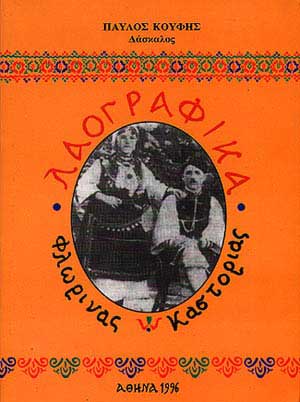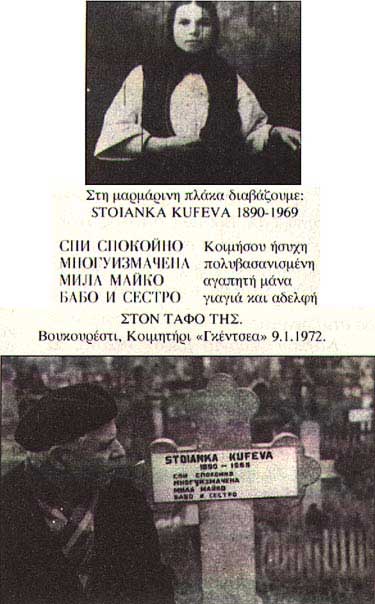In 1996, the publishing house “Eleni Golema” from Athens published the book “The Folklore in the Florina and Kastoria Region,” a rare and very important work by our fellow countryman Pavlos Koufis. The significance of this work is even greater seeing the larger part of the work is written in the Macedonian language – in a Florina and Kastoria dialect (with the Greek alphabet)
The author of the book, Pavlos Koufis, Macedonian by birth, was born in the beautiful Macedonian village of Armensko, Florina district, in 1913. He completed teacher’s college and the Academy for Military Reserve Officers. During World War II, he took part in the resistance movement. In the fall of 1944, he was one of the organizers of the opening of Macedonian schools in the Florina region, for which he was persecuted by the Greek authorities. In the Civil War, he fought in the ranks of the Greek Liberation Movement (GLM)(?), against the Greek monarcho-fascism, holding high-ranking military-political positions. Following the capitulation of the GLM in August 1949, he emigrated, first to the Soviet Union, and then to Romania, where he took an active part in various organizations and other institutions of the political refugees. He was a member of the Commission for Child Aid (EVOP), the editor of Macedonian school and other literature, the organizer and inspector of the Macedonian schools, editor of the Macedonian children’s magazine “Makedonche,” of the Macedonian page in the newspaper “Nov Zhivot,” (New Life) newspaper of the Greek and Macedonian political refugees in Romania, etc.
Following his repatriation in Greece in 1985, he became active in researching and studying the historical past, the ethnogenesis, the folklore and language of the Macedonian people in the Aegean part of Macedonia. So far, he has published the important works “Armensko, Florina Region – Struggles and Sacrifices;’ in 1990, “Folkloristics” in 1994, etc. In the preface to the book “The Folklore in the Florina and Kastoria Region,” the author, Pavlos Koufis, writes about the massive participation of the Macedonians in the Anti-Fascist and Civil War, in which they demonstrated massive heroism and made enormous sacrifices, stating that the Greek authorities had tried to uproot, convert and make them unknown, with the aim of obliterating their cultural identity, making them disappear. “This work,” the author says, “is an expression of the resistance of the Macedonians from that part of Macedonia against such efforts and attempts by the Greek regimes.”
The book is divided into several parts: At the beginning, the author Pavlos Koufis makes a brief retrospective of the Macedonian language. In one of the first pages, he writes: “It is the inalienable prerogative of man, of every human being, to speak, write and be educated in his language. Uninterruptedly.” “According to the official Greek terminology,” the author says, the local Slav language is called a “Slav language idiom.” The majority local population, on the other hand, speaking this language, says: “Our language is the Macedonian language.” In continuation, he delves into the specificity, the accent of the Macedonian language, the grammar, etc. In regard to the emergence of the first Macedonian spelling-books and reading-books and the Macedonian schools in the Aegean part of Macedonia between the two wars and during World War II, the author introduces some new and very important information. Furthermore, the author emphasizes the staging of the play “Macedonian Bloody Wedding” in the Kastoria and Florina regions, in local Macedonian language.
Further into the book, he provides the original titles of books, magazine, editions and other publications in Macedonian language, in the Cyrillic alphabet, published in Eastern European countries. In the second part, the recollections and narration of the Macedonians about the recent and distant historic past of the Macedonian people are republished; their customs, national traditions, wedding, holiday, humorist and revolutionary songs, collected and published in the Macedonian press in the countries of Eastern Europe.
The third part contains an excerpt of the study by Mihalis Gaptis “The Janoven Villages,” a small folklore zone in the Kastoria area (songs, wedding ceremonies, toponyms, etc.), published in the magazine “Pirsos” in l967. The last part consists of songs about Macedonian revolutionaries and events of a more recent date, that is, the National Liberation War and the Civil War. The book is enriched with a number of articles, black and white photographs about historical and other personalities, about inhabited areas, geographical maps and Macedonian folk costumes. The issues Pavlos Koufis tackles in this and other works and many other questions that characterize the Macedonian national identity are not only not present in Greece today, but are ignored, falsified, using all available means. Thus the great and multidimensional significance of this book.

Virtual Macedonia
Republic of Macedonia Home Page
Here at Virtual Macedonia, we love everything about our country, Republic of Macedonia. We focus on topics relating to travel to Macedonia, Macedonian history, Macedonian Language, Macedonian Culture. Our goal is to help people learn more about the "Jewel of the Balkans- Macedonia" - See more at our About Us page.
Leave a comment || Signup for email || Facebook |
History || Culture || Travel || Politics

















In the Civil War, he fought in the ranks of the Greek Liberation Movement (GLM)(?)
In his village he was known as Pavle Koufev – Daskalo and in the civil war he fought in the
“The Democratic Army of Greece” (DAG).
During the Italian/Bulgarian/German occupation he joined the resistance National Liberation Front (known by it its Greek acronym EAM) which was the political arm of ELAS (The Greek People’s Liberation Army (Greek: Ελληνικός Λαϊκός Απελευθερωτικός Στρατός (ΕΛΑΣ), Ellinikós Laïkós Apeleftherotikós Stratós; ELAS) was the military arm of the left-wing National Liberation Front (EAM) during the period of the Greek resistance until February 1945